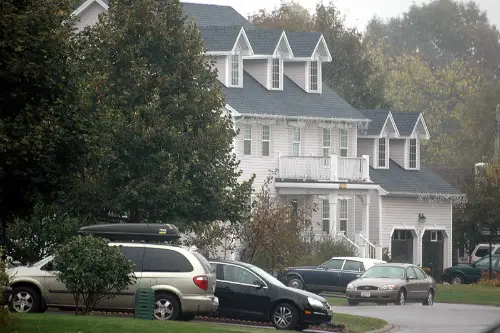1. Driving a Luxury Car

Rolling up in a BMW or Mercedes used to scream “I’ve made it.” It was a mobile status symbol, a reward for hard work. But in 2025, it often just means you’ve taken on a massive car loan—or worse, a lease with sky-high monthly payments. And with interest rates still elevated, that luxury ride might be driving you into debt.
Today, many Americans are rethinking what car ownership means. Electric vehicles, hybrids, and even used cars are gaining more respect. Flashy doesn’t always mean smart anymore. And the real flex might be owning your car outright.
2. Owning a Big House in the Suburbs

Once the ultimate symbol of success, the big suburban home with a two-car garage and a manicured lawn was the American Dream incarnate. It meant stability, family, and financial achievement. But today, that dream often comes with a crushing mortgage, rising property taxes, and endless maintenance costs. For many, it’s more stress than status.
With housing prices skyrocketing and wages lagging, owning a large home can feel more like a burden than a badge of honor. Millennials and Gen Z are increasingly opting for smaller spaces or renting by choice. The dream hasn’t died—but it’s definitely downsized. And the white picket fence now comes with a hefty price tag.
3. Sending Your Kids to Private School

Private school used to be a clear sign of affluence and ambition. It meant smaller class sizes, elite networks, and a leg up in life. But with tuition costs rivaling college and student debt already looming, it’s become a financial stretch for many families. Some are even taking out loans just to cover K–12 education.
Now, more parents are turning to public magnet schools, homeschooling, or alternative education models. The prestige of private school hasn’t disappeared—but the price tag is harder to justify. And for many, it’s no longer a guarantee of success. It’s just another line item in a growing pile of expenses.
4. Having a Country Club Membership

Once a hallmark of upper-middle-class life, a country club membership meant you’d arrived. Golf, tennis, catered brunches—it was all part of the package. But today, those dues can run into the thousands annually, and fewer people have the time or desire to use them. It’s a luxury that often sits unused.
Younger generations are opting for more flexible, less formal ways to socialize and stay active. Boutique gyms, public parks, and community events are replacing the old club model. The exclusivity now feels outdated—and expensive. And that membership card might be more of a financial drain than a social boost.
5. Taking Annual International Vacations

Jetting off to Europe or the Caribbean every year used to be a sign you were living well. It meant disposable income, paid time off, and a passport full of stamps. But with airfare, hotel prices, and travel insurance all on the rise, those trips are increasingly funded by credit cards. And the post-vacation glow often fades when the bill arrives.
More Americans are choosing road trips, staycations, or travel hacking with points. The idea of “travel as status” is shifting toward “travel as experience”—and affordability matters. That Instagram-perfect getaway might be masking a mountain of debt. And the real luxury is coming home without financial regret.
6. Wearing Designer Brands

Sporting a Gucci belt or Louis Vuitton bag used to be a clear flex. It meant you had taste, money, and access. But in 2025, it often just means you’ve racked up a credit card balance or bought into the resale hype. The line between luxury and liability is getting blurry.
With fast fashion and dupes flooding the market, brand recognition doesn’t carry the same weight. People are leaning into personal style, sustainability, and quality over logos. That $2,000 handbag might still turn heads—but it might also come with 24% APR. And that’s not exactly chic.
7. Hosting Lavish Weddings

A six-figure wedding used to be a symbol of success and social standing. It meant you could afford to throw the party of the year. But now, it often means you’ve taken out a personal loan or drained your savings before even starting married life. The average wedding cost in the U.S. is still over $30,000—and climbing.
Couples today are scaling back, eloping, or prioritizing honeymoons and homeownership instead. The pressure to impress is giving way to the desire for financial sanity. A big wedding doesn’t always mean you’ve made it—it might just mean you’re making payments. And love doesn’t need a ballroom to be real.
8. Owning the Latest Tech

Having the newest iPhone, smartwatch, or smart home setup used to signal that you were ahead of the curve. It meant you were plugged in, successful, and always upgrading. But now, it often means you’re locked into payment plans or trading in devices before they’re paid off. The tech treadmill is expensive—and relentless.
Many Americans are holding onto devices longer or buying refurbished. The thrill of “new” is being replaced by the satisfaction of “paid off.” And that shiny gadget might be more of a financial trap than a status symbol. Especially when last year’s model works just fine.
9. Owning a Vacation Home

A second home once meant you’d truly arrived. Whether it was a cabin in the woods or a condo by the beach, it was a sign of wealth and leisure. But now, it often means juggling two mortgages, two sets of utilities, and a whole lot of upkeep. And with rising property taxes and insurance costs, it’s not the escape it used to be.
Some owners try to offset costs by renting on Airbnb—but that comes with its own headaches. Others are selling altogether, realizing the dream doesn’t match the reality. A vacation home might still look impressive—but it can quietly drain your finances. And the freedom it promises often comes with strings attached.
10. Having a College Degree from a Private University

A degree from a prestigious private college used to be a golden ticket. It meant opportunity, connections, and a fast track to success. But with student loan debt now topping $1.7 trillion, that diploma often comes with decades of repayment. And the job market doesn’t always reward the investment.
More students are choosing community colleges, trade schools, or skipping college altogether. The ROI of a private degree is under scrutiny like never before. It’s still an achievement—but it’s no longer a guaranteed path to prosperity. And for many, it’s a financial weight they’ll carry for years.
This post 10 Things That Used to Mean You “Made It” in America—Now They Just Mean You’re in Debt was first published on American Charm.


